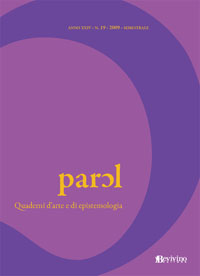“What Thou Lovest Well:” Elder’s Paradisiacal Images of the Female Body in The Book of All the Dead
In Parol.
(Bologna: Bevivino Editore) No. 19 (2009).
Abstract:
A recurrent topic of the critical response to Bruce Elder’s The Book of All the Dead has been the prevalence of the images of the female body.
Generally critics have taken this imagery to be related to the diaristic impulse that drives the films (Elder’s note on The Art of Worldly Wisdom,
the first chapter in his Book of All the Dead was “First composition from journals. A dark wood encountered the middle of life journey”), a preoccupation
with pleasure that diverts one from the asperities (or, to use one of Elder’s favorite words, the destitution) of our time.
I propose show that this view of the role of the images of the female body fundamentally misrepresents its role. Elder’s antagonism to narrative is
well-known, at least among film scholars. One should not expect that in recasting of the Commedia, he would be inclined to present the story Dante told
in strict chronological order. Indeed The Book of All the Dead is notoriously a work in which nearly every one of the protagonist’s steps forward soon
seems to be undone: the work nears the summit of the Mount of Purgatory, only to slide back into Hell, or later in the cycle, moves towards the beatific
vision, only to fall again into Purgatory.
|
But we could consider that forward-and-backwards rhythm as implying what Pound took it to mean, that Hell, Purgatory and Paradise are not geographically
distinct zones:
First came the seen, then thus the palpable
Elysium, though it were in the halls of hell
What thou lovest well is thy true heritage (Canto LXXIX)
Paradise enters the hell of the here-and-now. I argue that Elder’s images of female body have to be understood in this context.
Elder’s use of images of the female body is far more extravagant than his critics have acknowledged, for they are paradisical images.
Elder locates the wonder of creation in the female body; thus, the feminine instructs us in the nature of the Divine. This is an extravagant
recasting of the role Beatrice plays in the Commedia, but there is a basis in Dante’s text for so radically extending her function.
Full Text
|

